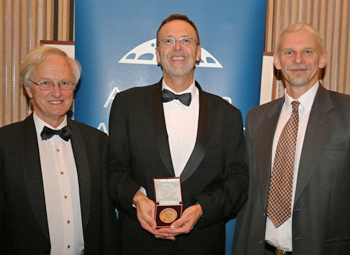
The 2018 Haddon Forrester King Medal was presented to Professor David Cooke in September, for the application of science to understanding the origin and discovery of mineral deposits.
The Haddon Forrester King Medal is awarded to scientists for original and sustained contributions to Earth and related sciences. The award is for work of particular relevance to the discovery, evaluation and exploitation of mineral deposits, including the hydrocarbons. The medal is sponsored by Rio Tinto.
Professor Jim Williams, Vice President of the Academy, awarded the medal to Professor Cooke at the Academy's Shine Dome. After receiving his medal Professor Cooke spoke on ‘New advances in geochemical exploration—detecting the subtle, but giant, geochemical footprints of porphyry copper and gold deposits using mineral chemistry’. Mr Paul Agnew, Chief Geologist, Technical Support and Technology Development, Rio Tinto Exploration, concluded the dinner with an appreciation of Professor Cooke’s work from an industry perspective and its strong application in Rio Tinto’s copper-gold exploration.
Professor Cooke is the Director of CODES, the Centre for Ore Deposit and Earth Sciences, and Director of the Australian Research Council’s Industrial Transformation Research Hub for Transforming the Mining Value Chain.
Professor Cooke’s main research theme is the geological, chemical and fluid processes that produce the world’s major copper–gold deposits, known as ‘porphyry copper deposits’. His recent research has focused on documenting changes in the chemistry of minerals surrounding these magmatic copper–gold deposits. Particular minerals retain trace elements in relative abundances which vary in patterns set by the temperature gradient and wall rock compositions. Systematic, rapid sampling of a prospective area can define mineral chemical vector techniques that companies can employ to assist targeting of drill holes designed to discover deeply buried deposits.
The importance of this work has been recognised by many companies that now employ the techniques as a routine procedure in exploration for magmatic copper–gold deposits.
As part of his award Professor Cooke is delivering lectures in Melbourne, Canberra and Townsville. The lecture tour was made possible through additional funding from Rio Tinto.
© 2026 Australian Academy of Science